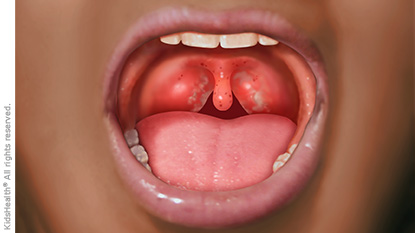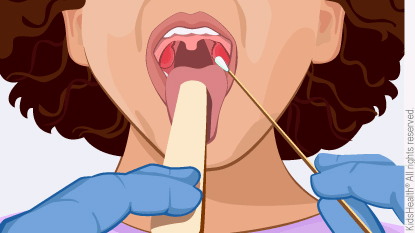Tonsillitis
Way in the back of your throat are your tonsils — one on the right and one on the left. They are part of your body's infection-fighting system to keep you from getting sick.
Tonsillitis (say: tahn-suh-LYE-tus) is an inflammation of the tonsils, usually caused by an infection by viruses or bacteria.
What Are Tonsils?
The tonsils' job is to help fight germs that come in through our mouth or nose before they cause infections in the rest of the body. Usually, tonsils do their job well. But sometimes bacteria or viruses get into the tonsils and infect them. When this happens, you have tonsillitis.
How Can I Tell if I Have Tonsillitis?
If you have tonsillitis, your throat usually hurts and it's hard to eat, drink, or even swallow. You also might have a fever.
Here are some other signs that bacteria or a virus are infecting your tonsils:
- red (swollen or irritated) tonsils
- a yellow or white coating on the tonsils
- swollen lymph nodes (sometimes called swollen “glands”) in the neck
- bad breath
- headache
- stomachache

What Will the Doctor Do?
The doctor will ask you how you've been feeling and then look at your tonsils. They'll probably use a wooden stick called a tongue depressor to help hold your tongue down to get a good look at what's going on in there.
The doctor also might look into your nose and ears, listen to your chest, feel your neck, and look for other signs of infection. Bacteria and viruses both can cause tonsillitis. It's important for your doctor to know if it's caused by strep bacteria. If you have this kind of infection, known as strep throat, you need medicine to kill the strep bacteria.
To check for strep, the doctor will use a long cotton swab to swipe the back of your throat. This test, called a throat culture, doesn't hurt but can feel a little weird. Your doctor may use the swab to do a test called a rapid strep test. Within minutes, this test will tell your doctor if there are any strep bacteria in your throat. If it's positive, you have strep throat. If it's negative, the doctor will send a sample to a lab for testing and get the result in a couple of days.

How Is Tonsillitis Treated?
If the tonsillitis is caused by strep bacteria, the doctor will prescribe antibiotics, a type of medicine that kills bacteria. It's very important to take the antibiotics exactly as directed and to finish the entire prescription — even if you start feeling better in a few days — or the infection could come back or cause more serious problems. Most kids can go back to school after they take the antibiotics for at least 12 hours and no longer have a fever.
If the tonsillitis is caused by a virus, antibiotics won't work and your body will fight off the infection on its own.
Sometimes kids get an operation to remove their tonsils, but only if their tonsils get infected a lot or are so big they make it hard for the kid to breathe at night.
How Can I Prevent Tonsillitis?
Tonsillitis is contagious. Talking, sneezing, coughing, or shaking hands can pass the germ causing the illness from one person to the next.
To protect yourself from catching tonsillitis or to prevent passing it to somebody else:
- Wash your hands well and often.
- If someone in your family or a friend has tonsillitis, don't use that person's cups, glasses, silverware, toothbrush, or other utensils. And if you have tonsillitis, keep your stuff separate and don't share it with anyone.
- Ask your parent for a new toothbrush after you feel better and are no longer contagious.
How Can I Feel Better?
If you get tonsillitis, here are some tips that can help you feel better:
- Drink plenty of fluids.
- If it hurts to swallow regular food, try smooth foods, like flavored gelatin, soups, ice pops, and applesauce.
- Take it easy until you feel better.
Soon your tonsils will be back in action and ready to fight germs again!
Reviewed by: Elana Pearl Ben-Joseph, MD
Date Reviewed: Mar 7, 2023
















